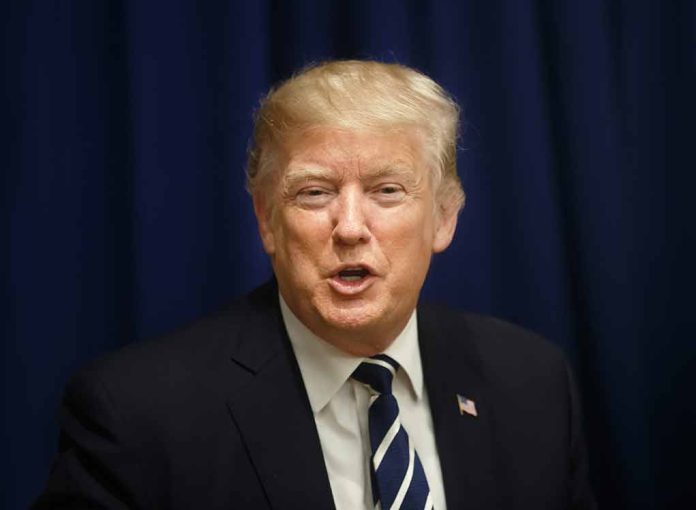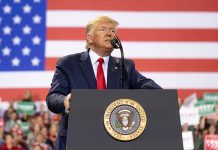
Former President Donald Trump proposes a 200% tariff on Chinese goods as a non-military deterrent against a potential Taiwan blockade, leveraging economic pressure over military intervention.
At a Glance
- Trump suggests 200% tariffs on Chinese goods to deter Taiwan blockade
- Only 37% of Americans support military intervention in Taiwan
- China recently conducted large-scale military drills near Taiwan
- U.S. officials warn against Chinese aggression towards Taiwan
- Experts recommend increasing U.S. military presence in Western Pacific
Trump’s Economic Strategy to Protect Taiwan
Former President Donald Trump has proposed implementing massive 200% tariffs on Chinese goods if China attempts to blockade Taiwan. This bold economic stance offers an alternative to military intervention, addressing growing tensions in the region while potentially safeguarding American interests. Trump’s approach aims to leverage economic pressure to maintain stability without risking American lives in overseas conflicts.
Trump’s proposal comes at a time when American public support for using military force to counter a Chinese blockade of Taiwan has significantly declined. Recent surveys indicate that only 37% of Americans support military intervention in such a scenario. This shift in public opinion underscores the need for alternative strategies to address potential conflicts in the region.
Trump's formula to deter the PRC on Taiwan is 200% tariffs, or he "might even shut down trade altogether" with a dollop of madman theory. https://t.co/4e2VTKL1E6 pic.twitter.com/dwV5rjIToP
— Julian Ku 古舉倫 (@julianku) October 20, 2024
Rising Tensions and Military Drills
The proposal comes amid escalating tensions between China and Taiwan. Recently, China conducted large-scale military drills near Taiwan, raising international concerns. The Chinese Communist Party’s “joint-sword 2024-B” drill focused on blockading key ports and areas around Taiwan, further heightening anxiety in the region.
“Former president Donald Trump said he “wouldn’t have to” use military force against a China blockade of Taiwan because Chinese communist leader Xi Jinping respects him and “knows I’m [expletive] crazy.”” – Donald Trump
Taiwan’s President Lai Ching-te recently reaffirmed the island’s sovereignty, prompting a strong reaction from China. The Pentagon criticized China’s military drill as destabilizing, while U.S. Secretary of State Antony Blinken warned against using Taiwan’s statements as a pretext for aggression.
Republican presidential candidate Donald Trump said he would impose additional tariffs on China if China were to "go into Taiwan," the Wall Street Journal reported. https://t.co/1GAuVQ5BnU
— The Japan Times (@japantimes) October 19, 2024
U.S. Response and Expert Recommendations
As tensions rise, the U.S. government maintains a deliberately vague policy regarding Taiwan’s defense. President Joe Biden has stated that the U.S. would defend Taiwan, but his administration has not clarified the extent of this commitment. This ambiguity has led to calls for more concrete strategies to deter potential Chinese aggression.
“Vice President Kamala Harris said in September 2022 that the United States would “continue to oppose any unilateral change to the status quo” and “continue to support Taiwan’s self-defense, consistent with our long-standing policy.””
Experts like Craig Singleton from the Foundation for Defense of Democracies suggest that the U.S. should increase its military presence in the Western Pacific and consider sanctions on Chinese entities. These recommendations aim to bolster deterrence without direct military confrontation. Meanwhile, China’s leader Xi Jinping has emphasized strengthening the country’s military capabilities, adding to regional unease.
The Complexity of U.S.-China-Taiwan Relations
The situation highlights the complex balance between economic measures and potential military actions in international relations. While Americans generally support Taiwan maintaining its status quo and participating in international organizations, there is less support for direct U.S. military intervention. This public sentiment aligns with Trump’s proposal to use economic leverage rather than military force.
As the global community watches closely, the effectiveness of economic deterrence versus military posturing remains to be seen. The proposed 200% tariffs represent a significant escalation in economic pressure, potentially reshaping the dynamics of U.S.-China relations and the future of Taiwan’s security.














